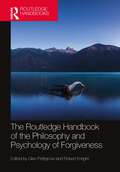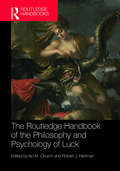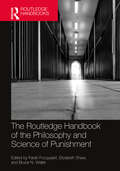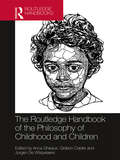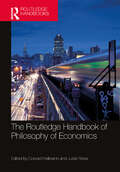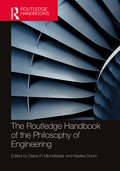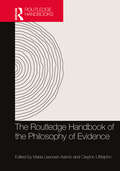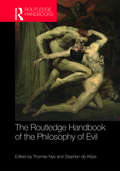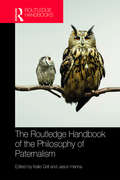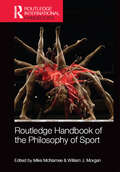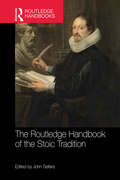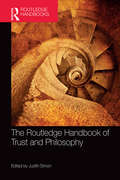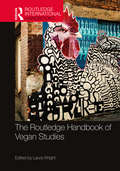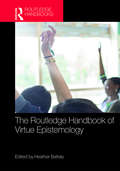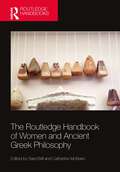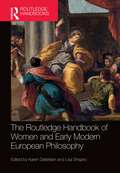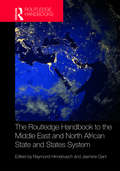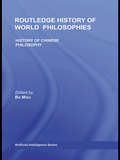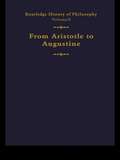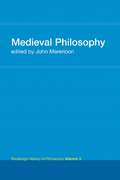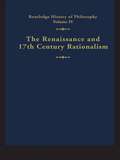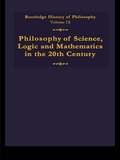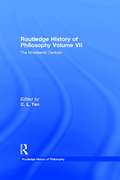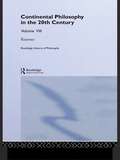- Table View
- List View
The Routledge Handbook of the Philosophy and Psychology of Forgiveness (Routledge Handbooks in Philosophy)
by Glen Pettigrove Robert EnrightThe Routledge Handbook of the Philosophy and Psychology of Forgiveness brings into conversation research from multiple disciplines, offering readers a comprehensive guide to current forgiveness research. Its 42 chapters, newly commissioned from an internationally acclaimed group of scholars, are divided into five parts: Religious Traditions Historic Treatments The Nature of Forgiveness Normative Issues Empirical Findings While the principal aim of the handbook is to provide a guide to the philosophical literature on forgiveness that, ideally, will inform the psychological sciences in developing more philosophically accurate measures and psychological treatments of forgiveness, the volume will be of interest to students and researchers with a wide range of disciplinary backgrounds, including philosophy, psychology, theology, religious studies, classics, history, politics, law, and education.
The Routledge Handbook of the Philosophy and Psychology of Luck (Routledge Handbooks in Philosophy)
by Ian M. Church Robert J. HartmanLuck permeates our lives, and this raises a number of pressing questions: What is luck? When we attribute luck to people, circumstances, or events, what are we attributing? Do we have any obligations to mitigate the harms done to people who are less fortunate? And to what extent is deserving praise or blame affected by good or bad luck? Although acquiring a true belief by an uneducated guess involves a kind of luck that precludes knowledge, does all luck undermine knowledge? The academic literature has seen growing, interdisciplinary interest in luck, and this volume brings together and explains the most important areas of this research. It consists of 39 newly commissioned chapters, written by an internationally acclaimed team of philosophers and psychologists, for a readership of students and researchers. Its coverage is divided into six sections: I: The History of Luck II: The Nature of Luck III: Moral Luck IV: Epistemic Luck V: The Psychology of Luck VI: Future Research. The chapters cover a wide range of topics, from the problem of moral luck, to anti-luck epistemology, to the relationship between luck attributions and cognitive biases, to meta-questions regarding the nature of luck itself, to a range of other theoretical and empirical questions. By bringing this research together, the Handbook serves as both a touchstone for understanding the relevant issues and a first port of call for future research on luck.
The Routledge Handbook of the Philosophy and Science of Punishment (Routledge Handbooks in Philosophy)
by Farah FocquaertPhilosophers, legal scholars, criminologists, psychiatrists, and psychologists have long asked important questions about punishment: What is its purpose? What theories help us better understand its nature? Is punishment just? Are there effective alternatives to punishment? How can empirical data from the sciences help us better understand punishment? What are the relationships between punishment and our biology, psychology, and social environment? How is punishment understood and administered differently in different societies? The Routledge Handbook of the Philosophy and Science of Punishment is the first major reference work to address these and other important questions in detail, offering 31 chapters from an international and interdisciplinary team of experts in a single, comprehensive volume. It covers the major theoretical approaches to punishment and its alternatives; emerging research from biology, psychology, and social neuroscience; and important special issues like the side-effects of punishment and solitary confinement, racism and stigmatization, the risk and protective factors for antisocial behavior, and victims' rights and needs. The Handbook is conveniently organized into four sections: I. Theories of Punishment and Contemporary Perspectives II. Philosophical Perspectives on Punishment III. Sciences, Prevention, and Punishment IV. Alternatives to Current Punishment Practices A volume introduction and a comprehensive index help make The Routledge Handbook of the Philosophy and Science of Punishment essential reading for upper-undergraduate and postgraduate students in disciplines such as philosophy, law, criminology, psychology, and forensic psychiatry, and highly relevant to a variety of other disciplines such as political and social sciences, behavioral and neurosciences, and global ethics. It is also an ideal resource for anyone interested in current theories, research, and programs dealing with the problem of punishment.
The Routledge Handbook of the Philosophy of Childhood and Children (Routledge Handbooks in Philosophy)
by Anca Gheaus Gideon Calder Jurgen De WispelaereChildhood looms large in our understanding of human life, as a phase through which all adults have passed. Childhood is foundational to the development of selfhood, the formation of interests, values and skills and to the lifespan as a whole. Understanding what it is like to be a child, and what differences childhood makes, are thus essential for any broader understanding of the human condition. The Routledge Handbook of the Philosophy of Childhood and Children is an outstanding reference source for the key topics, problems and debates in this crucial and exciting field and is the first collection of its kind. Comprising over thirty chapters by a team of international contributors the Handbook is divided into five parts: · Being a child · Childhood and moral status · Parents and children · Children in society · Children and the state. Questions covered include: What is a child? Is childhood a uniquely valuable state, and if so why? Can we generalize about the goods of childhood? What rights do children have, and are they different from adults’ rights? What (if anything) gives people a right to parent? What role, if any, ought biology to play in determining who has the right to parent a particular child? What kind of rights can parents legitimately exercise over their children? What roles do relationships with siblings and friends play in the shaping of childhoods? How should we think about sexuality and disability in childhood, and about racialised children? How should society manage the education of children? How are children’s lives affected by being taken into social care? The Routledge Handbook of the Philosophy of Childhood and Children is essential reading for students and researchers in philosophy of childhood, political philosophy and ethics as well as those in related disciplines such as education, psychology, sociology, social policy, law, social work, youth work, neuroscience and anthropology.
The Routledge Handbook of the Philosophy of Economics (Routledge Handbooks in Philosophy)
by Conrad Heilmann Julian ReissThe most fundamental questions of economics are often philosophical in nature, and philosophers have, since the very beginning of Western philosophy, asked many questions that current observers would identify as economic. The Routledge Handbook of Philosophy of Economics is an outstanding reference source for the key topics, problems, and debates at the intersection of philosophical and economic inquiry. It captures this field of countless exciting interconnections, affinities, and opportunities for cross-fertilization. Comprising 35 chapters by a diverse team of contributors from all over the globe, the Handbook is divided into eight sections: I. RationalityII. Cooperation and InteractionIII. MethodologyIV. ValuesV. Causality and ExplanationVI. Experimentation and SimulationVII. EvidenceVIII. Policy The volume is essential reading for students and researchers in economics and philosophy who are interested in exploring the interconnections between the two disciplines. It is also a valuable resource for those in related fields like political science, sociology, and the humanities.
The Routledge Handbook of the Philosophy of Engineering (Routledge Handbooks in Philosophy)
by Diane P. Michelfelder; Neelke DoornEngineering has always been a part of human life but has only recently become the subject matter of systematic philosophical inquiry. The Routledge Handbook of the Philosophy of Engineering presents the state-of-the-art of this field and lays a foundation for shaping future conversations within it. With a broad scholarly scope and 55 chapters contributed by both established experts and fresh voices in the field, the Handbook provides valuable insights into this dynamic and fast-growing field. The volume focuses on central issues and debates, established themes, and new developments in: Foundational perspectives Engineering reasoning Ontology Engineering design processes Engineering activities and methods Values in engineering Responsibilities in engineering practice Reimagining engineering The Routledge Handbook of the Philosophy of Engineering will be of value for both students and active researchers in philosophy of engineering and in cognate fields (philosophy of technology, philosophy of design). It is also intended for engineers working both inside and outside of academia who would like to gain a more fundamental understanding of their particular professional field. The increasing development of new technologies, such as autonomous vehicles, and new interdisciplinary fields, such as human-computer interaction, calls not only for philosophical inquiry but also for engineers and philosophers to work in collaboration with one another. At the same time, the demands on engineers to respond to the challenges of world health, climate change, poverty, and other so-called "wicked problems" have also been on the rise. These factors, together with the fact that a host of questions concerning the processes by which technologies are developed have arisen, make the current Handbook a timely and valuable publication.
The Routledge Handbook of the Philosophy of Evidence (Routledge Handbooks in Philosophy)
by Maria Lasonen-Aarnio Clayton LittlejohnWhat one can know depends on one’s evidence. Good scientific theories are supported by evidence. Our experiences provide us with evidence. Any sort of inquiry involves the seeking of evidence. It is irrational to believe contrary to your evidence. For these reasons and more, evidence is one of the most fundamental notions in the field of epistemology and is emerging as a crucial topic across academic disciplines. The Routledge Handbook of the Philosophy of Evidence is an outstanding reference source to the key topics, problems, and debates in this exciting subject and is the first major volume of its kind. Comprising forty chapters by an international team of contributors the handbook is divided into six clear parts: The Nature of Evidence Evidence and Probability The Social Epistemology of Evidence Sources of Evidence Evidence and Justification Evidence in the Disciplines The Routledge Handbook of the Philosophy of Evidence is essential reading for students and researchers in philosophy of science and epistemology, and will also be of interest to those in related disciplines across the humanities and social sciences, such as law, religion, and history.
The Routledge Handbook of the Philosophy of Evidence (Routledge Handbooks in Philosophy)
by Maria Lasonen-Aarnio Clayton LittlejohnWhat one can know depends on one’s evidence. Good scientific theories are supported by evidence. Our experiences provide us with evidence. Any sort of inquiry involves the seeking of evidence. It is irrational to believe contrary to your evidence. For these reasons and more, evidence is one of the most fundamental notions in the field of epistemology and is emerging as a crucial topic across academic disciplines.The Routledge Handbook of the Philosophy of Evidence is an outstanding reference source to the key topics, problems, and debates in this exciting subject and is the first major volume of its kind. Comprising forty chapters by an international team of contributors the handbook is divided into six clear parts: The Nature of Evidence Evidence and Probability The Social Epistemology of Evidence Sources of Evidence Evidence and Justification Evidence in the Disciplines The Routledge Handbook of the Philosophy of Evidence is essential reading for students and researchers in philosophy of science and epistemology, and will also be of interest to those in related disciplines across the humanities and social sciences, such as law, religion, and history.
The Routledge Handbook of the Philosophy of Evil (Routledge Handbooks in Philosophy)
by Thomas Nys Stephen De WijzeWhy ought we concern ourselves with understanding a concept of evil? It is an elusive and politically charged concept which critics argue has no explanatory power and is a relic of a superstitious and primitive religious past. Yet its widespread use persists today: we find it invoked by politicians, judges, journalists, and many others to express the view that certain actions, persons, institutions, or ideologies are not just morally problematic but require a special signifier to mark them out from the ordinary and commonplace. Therefore, the question of what a concept of evil could mean and how it fits into our moral vocabulary remains an important and pressing concern. The Routledge Handbook of the Philosophy of Evil provides an outstanding overview and exploration of these issues and more, bringing together an international team of scholars working on the concept of evil. Its 27 chapters cover the crucial discussions and arguments, both historical and contemporary, that are needed to properly understand the historical development and complexity of the concept of evil. The Handbook is divided into three parts: Historical explorations of evil Recent secular explorations of evil Evil and other issues. The Routledge Handbook of the Philosophy of Evil is essential reading for students and researchers in the fields of ethics and philosophy of psychology. It also provides important insights and background for anyone exploring the concept of evil in related subjects such as literature, politics, and religion.
The Routledge Handbook of the Philosophy of Paternalism (Routledge Handbooks in Applied Ethics)
by Kalle Grill Jason HannaWhile paternalism has been a long-standing philosophical issue, it has recently received renewed attention among scholars and the general public. The Routledge Handbook of the Philosophy of Paternalism is an outstanding reference source to the key topics, problems and debates in this exciting subject and is the first collection of its kind. Comprising twenty-seven chapters by a team of international contributors the handbook is divided into five parts: • What is Paternalism? • Paternalism and Ethical Theory • Paternalism and Political Philosophy • Paternalism without Coercion • Paternalism in Practice Within these sections central debates, issues and questions are examined, including: how should paternalism be defined or characterized? How is paternalism related to such moral notions as rights, well-being, and autonomy? When is paternalism morally objectionable? What are the legitimate limits of government benevolence? To what extent should medical practice be paternalistic? The Routledge Handbook of the Philosophy of Paternalism is essential reading for students and researchers in applied ethics and political philosophy. The handbook will also be very useful for those in related fields, such as law, medicine, sociology and political science.
Routledge Handbook of the Philosophy of Sport (Routledge International Handbooks)
by Mike McNamee William J. MorganThe Routledge Handbook of the Philosophy of Sport is a landmark publication in sport studies. It goes further than any book has before in tracing the contours of the discipline of the philosophy of sport and in surveying the core themes, approaches and theories that form its disciplinary fabric. The book explores the ways in which an understanding of philosophy can inform our understanding of important prevailing issues in sport. Edited by two of the most significant figures in the development of the philosophy of sport, Mike McNamee and Bill Morgan, and with contributions from many of the world’s leading sport philosophers, this is an invaluable companion reference volume for any course in the social scientific study of sport, and an essential addition to the bookshelf of any serious scholar of the philosophy and/or ethics of sport.
The Routledge Handbook of the Stoic Tradition (Routledge Handbooks in Philosophy)
by John SellarsThe ancient philosophy of stoicism has been a crucial and formative influence on the development of Western thought since its inception through to the present day. It is not only an important area of study in philosophy and classics, but also in theology and literature. The Routledge Handbook of the Stoic Tradition is the first volume of its kind, and an outstanding guide and reference source to the nature and continuing significance of stoicism. Comprising twenty-six chapters by a team of international contributors and organised chronologically, the Handbook is divided into four parts: Antiquity and the Middle Ages, including stoicism in Rome; stoicism in early Christianity; the Platonic response to stoicism; and stoic influences in the late Middle Ages Renaissance and Reformation, addressing the impact of stoicism on the Italian Renaissance, Reformation thought, and early modern English literature including Shakespeare Early Modern Europe, including stoicism and early modern French thought; the stoic influence on Spinoza and Leibniz; stoicism and the French and Scottish Enlightenment; and Kant and stoic ethics The Modern World, including stoicism in nineteenth century German philosophy; stoicism in Victorian culture; stoicism in America; stoic themes in contemporary Anglo-American ethics; and the stoic influence on modern psychotherapy. An invaluable resource for anyone interested in the philosophical history and impact of stoic thought, The Routledge Handbook of the Stoic Tradition is essential reading for all students and researchers working on the subject.
The Routledge Handbook of Trust and Philosophy (Routledge Handbooks in Philosophy)
by Judith SimonTrust is pervasive in our lives. Both our simplest actions – like buying a coffee, or crossing the street – as well as the functions of large collective institutions – like those of corporations and nation states – would not be possible without it. Yet only in the last several decades has trust started to receive focused attention from philosophers as a specific topic of investigation. The Routledge Handbook of Trust and Philosophy brings together 31 never-before published chapters, accessible for both students and researchers, created to cover the most salient topics in the various theories of trust. The Handbook is broken up into three sections: I. What is Trust? II. Whom to Trust? III. Trust in Knowledge, Science, and Technology The Handbook is preceded by a foreword by Maria Baghramian, an introduction by volume editor Judith Simon, and each chapter includes a bibliography and cross-references to other entries in the volume.
The Routledge Handbook of Vegan Studies (Routledge International Handbooks)
by Laura WrightThis wide-ranging volume explores the tension between the dietary practice of veganism and the manifestation, construction, and representation of a vegan identity in today’s society. Emerging in the early 21st century, vegan studies is distinct from more familiar conceptions of "animal studies," an umbrella term for a three-pronged field that gained prominence in the late 1990s and early 2000s, consisting of critical animal studies, human animal studies, and posthumanism. While veganism is a consideration of these modes of inquiry, it is a decidedly different entity, an ethical delineator that for many scholars marks a complicated boundary between theoretical pursuit and lived experience. The Routledge Handbook of Vegan Studies is the must-have reference for the important topics, problems, and key debates in the subject area and is the first of its kind. Comprising over 30 chapters by a team of international contributors, this handbook is divided into five parts: History of vegan studies Vegan studies in the disciplines Theoretical intersections Contemporary media entanglements Veganism around the world These sections contextualize veganism beyond its status as a dietary choice, situating veganism within broader social, ethical, legal, theoretical, and artistic discourses. This book will be essential reading for students and researchers of vegan studies, animal studies, and environmental ethics.
The Routledge Handbook of Virtue Epistemology (Routledge Handbooks in Philosophy)
by Heather BattalyWhat is an epistemic virtue? Are epistemic virtues reliable? Are they motivated by a love of truth? Do epistemic virtues produce knowledge and understanding? How can we develop epistemic virtues? The Routledge Handbook of Virtue Epistemology answers all of these questions. This landmark volume provides a pluralistic and comprehensive picture of the field of virtue epistemology. It is the first large-scale volume of its kind on the topic. Composed of 41 chapters, all published here for the first time, it breaks new ground in four areas. It articulates the structure and features of epistemic virtues. It provides in-depth analyses of 10 individual epistemic virtues. It examines the connections between epistemic virtue, knowledge, and understanding. It applies virtue epistemology, and explores its impact on related fields. The contributing authors are pioneers in the study of epistemic virtue. This volume is an outstanding resource for students and scholars in philosophy, as well as researchers in intersecting fields, including education, psychology, political science, and women’s studies.
The Routledge Handbook of Women and Ancient Greek Philosophy (Routledge Handbooks in Philosophy)
by Sara Brill Catherine McKeenThe Routledge Handbook of Women and Ancient Greek Philosophy is an essential reference source for cutting-edge scholarship on women, gender, and philosophy in Greek antiquity. The volume features original research that crosses disciplines, offering readers an accessible guide to new methods, new sources, and new questions in the study of ancient Greek philosophy and its multiple afterlives. Comprising 40 chapters from a diverse international group of experts, the Handbook considers questions about women and gender in sources from Greek antiquity spanning the period from 7th c. BCE to 2nd c. BCE, and in receptions of Greek antiquity from the Roman Imperial period, through the European Renaissance to the current day. Chapters are organized into five major sections: I. Early Greek antiquity – including Sappho, Presocratic philosophy, Sophists, and Greek tragedy – 700s–400s BCEII. Classical Greek antiquity – including Aeschines, Plato, and Xenophon – 400s–300s BCEIII. Late Classical Greek to Hellenistic antiquity – including Cyrenaics, Cynics, the Hippocratic corpus, and Aristotle – 300s–200s BCEIV. Late Greek antiquity to Roman Imperial period – including Pythagorean women, Stoics, Pyrrhonian Skeptics, and late Platonists – 200s BCE to 700s CEV. Later receptions – including Shakespeare, the European Renaissance, Anna Julia Cooper, W.E.B. DuBois, Jane Harrison, Sarah Kofman, and Toni MorrisonThe Routledge Handbook of Women and Ancient Greek Philosophy is a vital resource for students and scholars in philosophy, Classics, and gender studies who want to gain a deeper understanding of philosophy’s rich past and explore sources and questions beyond the traditional canon. The volume is a valuable resource, as well, for students and scholars from history, humanities, literature, political science, religious studies, rhetorical studies, theatre, and LGBTQ and sexuality studies.
The Routledge Handbook of Women and Early Modern European Philosophy (Routledge Handbooks in Philosophy)
by Karen Detlefsen Lisa ShapiroThe Routledge Handbook of Women and Early Modern European Philosophy is an outstanding reference source for the wide range of philosophical contributions made by women writing in Europe from about 1560 to 1780. It shows the range of genres and methods used by women writing in these centuries in Europe, thus encouraging an expanded understanding of our historical canon. Comprising 46 chapters by a team of contributors from all over the globe, including early career researchers, the Handbook is divided into the following sections: I. Context II. Themes A. Metaphysics and Epistemology B. Natural Philosophy C. Moral Philosophy D. Social-Political PhilosophyIII. FiguresIV. State of the Field The volume is essential reading for students and researchers in philosophy who are interested in expanding their understanding of the richness of our philosophical past, including in order to offer expanded, more inclusive syllabi for their students. It is also a valuable resource for those in related fields like gender and women’s studies; history; literature; sociology; history and philosophy of science; and political science.
The Routledge Handbook to the Middle East and North African State and States System
by Raymond Hinnebusch Jasmine GaniConflict and instability are built into the very fabric of the Middle East and North African (MENA) state and states system; yet both states and states system have displayed remarkable resilience. How can we explain this? This handbook explores the main debates, theoretical approaches and accumulated empirical research by prominent scholars in the field, providing an essential context for scholars pursuing research on the MENA state and states system. Contributions are grouped into four key themes: • Historical contexts, state-building and politics in MENA • State actors, societal context and popular activism • Trans-state politics: the political economy and identity contexts • The international politics of MENA The 26 chapters examine the evolution of the state and states system, before and after independence, and take the 2011 Arab uprisings as a pivotal moment that intensified trends already embedded in the system, exposing the deep features of state and system—specifically their built-in vulnerability and their ability to survive. This handbook provides comprehensive coverage of the history and role of the state in the MENA region. It offers a key resource for all researchers and students interested in international relations and the Middle East and North Africa.
The Routledge History of Chinese Philosophy: Constructive Engagement (Routledge History of World Philosophies #Vol. 27)
by Bo MouThe History of Chinese Philosophy is a comprehensive and authoritative examination of the movements and thinkers that have shaped Chinese philosophy over the last three thousand years. An outstanding team of international contributors provide seventeen accessible entries organised into five clear parts: Identity of Chinese Philosophy Classical Chinese Philosophy (I): Pre-Han Period Classical Chinese Philosophy (II): From Han Through Tang Classical Chinese Philosophy (III): From Song Through Early Qing Modern Chinese Philosophy: From Late Qing Through 21st Century This outstanding collection is essential reading for students of Chinese philosophy, and will be of interest to those seeking to explore the lasting significance this rich and complex philosophical tradition.
Routledge History of Philosophy Volume II: Aristotle to Augustine (Routledge History of Philosophy #Vol. 2)
by David FurleyThe final volume to be published in the acclaimed Routledge History of Philosophy series provides an authoritative and comprehensive survey and analysis of the key areas of late Greek and early Christian Philosophy.
Routledge History of Philosophy Volume III: Medieval Philosophy (Routledge History of Philosophy)
by John MarenbonThe philosophy discussed in this volume constitutes the intellectual and philosophical ideas of the medieval era, from Aquinas and Anselm, the intellectual philosophy of the Judaic and Arabic traditions, the Twelfth Century Renaissance and the philosophical ideas associated with the emergence of the universities. This volume provides a broad and scholarly introduction to the major authors and issues involved in the philosophical discourse of the medieval era, as well as some original interpretations of the philosophical writings addressed. It includes a glossary of technical terms and a chronological table of philosophical and other cultural events.
Routledge History of Philosophy Volume IV: The Renaissance and Seventeenth Century Rationalism (Routledge History of Philosophy)
by G. H. R. ParkinsonFirst published in 1993. Routledge is an imprint of Taylor & Francis, an informa company.
Routledge History of Philosophy Volume IX: Philosophy of the English-Speaking World in the Twentieth Century 1: Science, Logic and Mathematics (Routledge History of Philosophy)
by Stuart. G. ShankerVolume 9 of the Routledge History of Philosophy surveys ten key topics in the philosophy of science, logic and mathematics in the twentieth century. Each of the essays is written by one of the world's leading experts in that field. Among the topics covered are the philosophy of logic, of mathematics and of Gottlob Frege; Ludwig Wittgenstein's Tractatus; a survey of logical positivism; the philosophy of physics and of science; probability theory, cybernetics and an essay on the mechanist/vitalist debates.The volume also contains a helpful chronology to the major scientific and philosophical events in the twentieth century. It also provides an extensive glossary of technical terms in the notes on major figures in these fields.
Routledge History of Philosophy Volume VII: The Nineteenth Century (Routledge History of Philosophy)
by C. L. TenThe Nineteenth Century provides a broad, scholarly introduction to nineteenth-century philosophy. It also contains a glossary of philosophical terms and a chronological table of philosophical and cultural events.
Routledge History of Philosophy Volume VIII: Twentieth Century Continental Philosophy (Routledge History of Philosophy)
by Richard KearneyFirst published in 1994. Routledge is an imprint of Taylor & Francis, an informa company.
